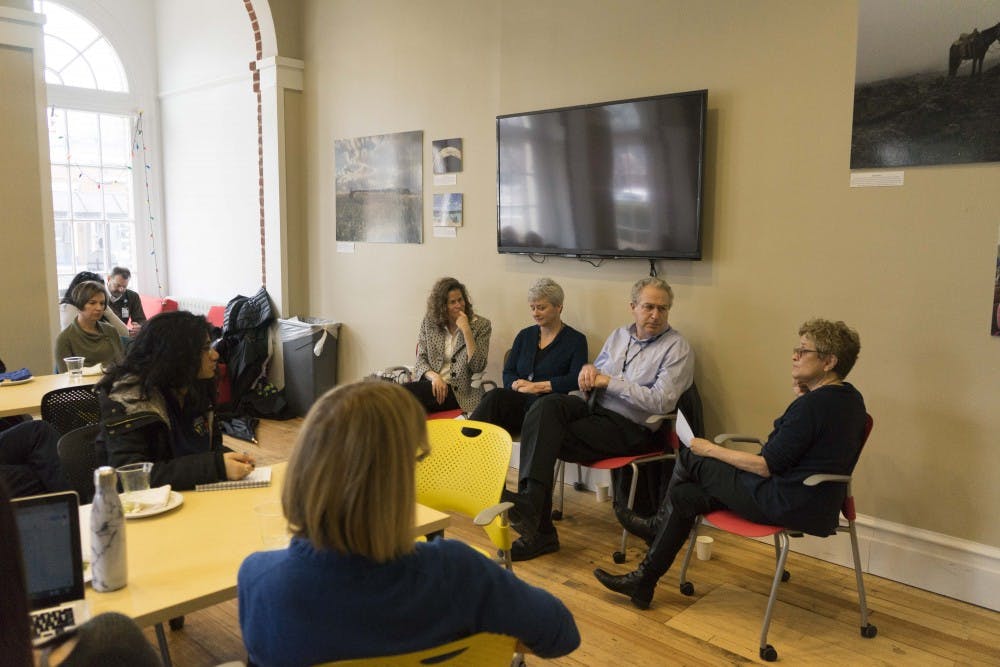Panelists, students and community members gathered at the Center for Global Health Tuesday to discuss advocacy for planetary and population health around the globe. The panel was co-sponsored by the Environmental Resilience Institute, the Global Infectious Disease Institute and the Center for Global Health.
Panelists included Deborah Lawrence, assistant professor of Environmental Sciences, Ellen Bassett, associate professor of and chair of Urban and Environmental Planning, and Daniel Engel, professor of Microbiology, Immunology and Cancer Biology in the University’s School of Medicine.
The conference focused on the importance of addressing the issues of climate change from an interdisciplinary perspective and a shared approach among experts from different academic fields to encourage a universal way of thinking about global health.
Michele Barry — senior associate dean and director of the Center for Innovation in Global Health in the Stanford School of Medicine — moderated the panel. Barry opened the discussion by alluding to the drought occuring in her home state of California, stating that the issue of climate change should not only be addressed on a global level, but from a local perspective as well.
The panelists agreed that working with experts across multiple academic disciplines to understand the different approaches to climate change in the context of global health is essential if progress is to be made in the future.
“Working together side by side over time — that’s what you have to have,” Bassett said. “Ultimately you want to be able to walk away and have all the capacities there.”
Lawrence said that a healthy and stable climate starts with a single action and added that this is an ideal everyone should be encouraged to believe in. Lawrence added that it is cheaper to deal with climate change now than to pay for it later.
“There has to be some hope and there has to be some action,” Lawrence said. “I think we get that movement by having people believe that what they do every day — the way they live their lives — actually changes the future … So believe that your life can change, you change your life, there is a new normal and that new normal elects the right people in 2018.”
During the discussion, Preston Reynolds — a professor of Medicine at the University — said the way to infuse different academic disciplines on the issue of climate change is focusing on a common goal.
“Another way of looking at it though, is looking [at] the different disciplines in this room and the interest in climate change, and saying that even within a variety of different disciplines you can pursue climate change,” Reynolds said. “It doesn’t have to be a track in global health interdisciplinary, but a goal toward climate change across disciplines that then comes together in a common conversation.”
Lawrence added that an interdisciplinary approach to climate change is less challenging when focusing on a common place. She said that different disciplines do not necessarily understand certain concepts the same way but added that working together in the same place and at the same time can improve these relationships.
“If you all focus on the same place, it does help because while you’re fumbling around trying to get to know each other, you’re at least studying the same phenomena,” Lawrence said. “Shared places are important — as well as shared ideas — but places really make it real. A city or a region as opposed to just a topic which you can do your own thing on.”
Rebecca Dillingham, director of the Center for Global Health, agreed with Lawrence on this issue. She said that promoting a shared space for dialogue between faculty and community members at the University is a progressive step towards tackling climate change the future.
“Making a space that includes community members as well as faculty members from across schools to be able to develop the trust [is] necessary, honestly to make mistakes because mistakes will be made, and once you have that trust you can weather those scientifically and personally,” Dillingham said.
Fourth-year College student Claire Romaine, who attended the panel discussion, said that having faculty and community members from different academic departments at the conference enhanced the discussion.
“We weren’t just listening to the panelists and them talking about their research, but we heard input from a finance perspective, a Comm school professor, we heard from an economist, people in international relations — so I thought that the diversity of the audience really added to it as well,” Romaine said.







